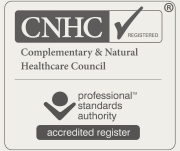PSORIASIS
Psoriasis is a skin condition that causes red, flaky, crusty patches of skin covered with silvery scales that itch.

Psoriasis is characterised by sharply bordered reddish rash or plaques often with overlapping silvery scales. It usually appears on the scalp, wrists, elbows, knees, buttocks and ankles. Skin cells turnover in 2-6 days rather than the typical 3-4 weeks. Often there is a family history of it and can be linked with other autoimmune diseases like celiac disease.
What other symptoms might there be with psoriasis?
- Pitted nails – psoriasis can affect the nails and produces a variety of changes in the appearance of fingers and toenails. Nail psoriasis occurs in 40–45% of people with psoriasis affecting the skin, and has a lifetime incidence of 80–90% in those with psoriatic arthritis.
- Psoriatic arthritis – is a form of chronic inflammatory arthritis that has a highly variable clinical presentation and frequently occurs in association with skin and nail psoriasis.
- Pinpoint bleeding when skin is removed – the skin is itchy with a desire and relief from scratching.
What causes psorasis?
- Gut health – as 70-80% of your immune system lies in your gut, the gut is crucial for regulating the immune response. If gut bacteria is not optimal and there is ‘leaky gut’ where there is hyper permeability of the gut lining, then the immune system is less able to respond to invaders and fight them off. Also, with leaky gut, molecules of undigested food or toxins from bacteria or fungus, can enter the bloodstream and cause an immune response to be mounted. Low digestive enzymes can also be a factor.
- Stress – long term stress that is poorly managed can suppress the immune system and can contribute to the triggering of autoimmunity as well as causing flare-ups. Often stress is a trigger for the development of psoriasis.
- Liver detoxification pathways – sometimes the liver can become overwhelmed with excess bowel toxins or if the liver is burdened through alcohol for example or is impaired in any way then this can worsen psoriasis.
- Family History – this is a factor in 50% of cases.
Conventional approach
Often these are corticosteroid creams to help reduce inflammation and redness but there are often side effects and withdraw issues. There are also other creams that are derived from vitamin A and vitamin D that can help to normalise DNA activity in the skin and slow cell growth.
Things you can do:
- Eliminate gluten as this can be a big trigger.
- Try a vegetarian diet to minimise the more inflammatory arachidonic acids from animal products. Emphasise plant foods (fruits, vegetables, beans, seeds, nuts).
- Avoid alcohol
- Check your vitamin D level.
- Stress reduction – try meditation, yoga, anything that puts you into the relaxation response in the body.
What can Functional Medicine do to support?
- Our goal is to find the underlying causes of autoimmunity and the ongoing triggers for your symptoms through functional testing that looks at; gut health, liver function and vitamin status.
- Support through diet, supplements and lifestyle modifications to help your immune system rebalance and inflammation to reduce.
5 Pillars of Functional Medicine

Managing Stress
Chronic stress can lead to an increased risk for many diseases through
suppression of the immune system. Lets find ways to manage stress and to
nurture, to calm, to re-set and restore the immune and nervous system.

Sleep
Sleep is the first like of defence against infectious disease. Getting good quality
sleep is restorative and preventative. We’ll work together to ensure you have
a good sleep routine and get a least 7 – 9hrs restful sleep a night.

Nutrition
Food is our medicine; it tells us what genes to switch on or off, it gives the cells
the nutrients that the body needs to function and provides the energy that we
need to lead an enriched life. Here, we’re all about enjoying food for life.

Relationships
Toxicity is not just about chemicals and pesticides; toxicity can come from
relationships and can affect our physical and mental health and well-being.
We’re all for healthy relationships that help us to thrive and grow as human beings.

Exercise
Lack of exercise is the primary cause of most chronic diseases and also accelerates ageing.
Exercising can prevent or delay the onset of chronic disease and it supports
better sleep, assists in weight control, improves mood and boosts energy.
Psoriasis and Functional Medicine
Do you suffer from psoriasis and have tried all the usual approaches?
Functional Medicine can help you, simply book an online consultation or arrange a free 15 minute discovery call and find out how we can help.





